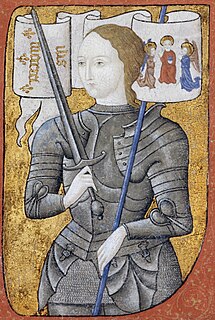
Joan of Arc, nicknamed "The Maid of Orléans", is considered a heroine of France for her role during the Lancastrian phase of the Hundred Years' War, and was canonized as a Catholic saint. She was born to Jacques d'Arc and Isabelle Romée, a peasant family, at Domrémy in the Vosges of northeast France. Joan claimed to have received visions of the archangel Michael, Saint Margaret, and Saint Catherine of Alexandria instructing her to support Charles VII and recover France from English domination late in the Hundred Years' War. The as-yet-unanointed King Charles VII sent Joan to the Siege of Orléans as part of a relief army. She gained prominence after the siege was lifted only nine days later. Several additional swift victories led to Charles VII's consecration at Reims. This long-awaited event boosted French morale and paved the way for the final French victory at Castillon in 1453.
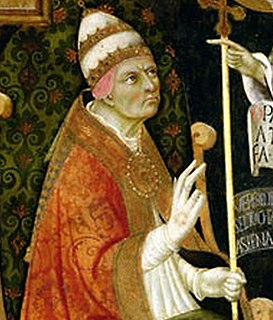
Pope Callixtus III, born Alfonso de Borgia, was head of the Catholic Church and ruler of the Papal States from 8 April 1455 to his death. Borgia spent his early career as a professor of law at the University of Lleida; he later served as a diplomat for the kings of Aragon. He became a tutor for King Alfonso V's illegitimate son Ferdinand. After arranging a reconciliation between Alfonso and Pope Martin V, Borgia was made Bishop of Valencia. In 1444, Pope Eugene IV named him a cardinal, and Borgia became a member of the Roman Curia. During the Siege of Belgrade (1456), Callixtus initiated the custom that bells be rung at midday to remind the faithful to pray for the crusaders. The tradition of the Angelus noon bell still exists in most Catholic Churches to this day. He was also responsible for the retrial of Joan of Arc that saw her vindicated. He appointed two nephews as cardinals, one of whom became Pope Alexander VI.

Theda Bara was an American silent film and stage actress.

The Passion of Joan of Arc is a 1928 French silent historical film based on the actual record of the trial of Joan of Arc. The film was directed by Carl Theodor Dreyer and stars Renée Jeanne Falconetti as Joan. It is widely regarded as a landmark of cinema, especially for its production, Dreyer's direction and Falconetti's performance, which is often listed as one of the finest in cinema history. The film summarizes the time that Joan of Arc was a captive of England, depicting her trial and execution.

Joan of Arc is an American indie rock band from Chicago, Illinois named after the French saint Joan of Arc. They formed in 1995, following the breakup of Cap'n Jazz.

William Frederick Burr is an American stand-up comedian, actor, and podcast host. He created and stars in the Netflix animated sitcom F Is for Family (2015–present), played Patrick Kuby in the AMC crime drama series Breaking Bad (2008–2013), and Migs Mayfeld in the Star Wars TV Series The Mandalorian (2019-present). He co-founded the All Things Comedy network. He has hosted the twice-weekly comedy podcast, titled The Monday Morning Podcast, since May 2007.

Joan of Arc has inspired artistic and cultural works for nearly six centuries. The following lists cover various media to include items of historic interest, enduring works of high art, and recent representations in popular culture. The entries represent portrayals that a reader has a reasonable chance of encountering rather than a complete catalog. Lesser known works, particularly from early periods, are not included. In this article, many of the excluded items are derivative of better known representations. For instance, Schiller's play inspired at least 82 different dramatic works during the nineteenth century, and Verdi's and Tchaikovsky's operatic adaptations are still recorded and performed. Most of the others survive only in research libraries. As another example, in 1894, Émile Huet listed over 400 plays and musical works about Joan of Arc. Despite a great deal of scholarly interest in Joan of Arc, no complete list of artistic works about her exists, although a 1989 doctoral dissertation did identify all relevant films including ones for which no copy survives.
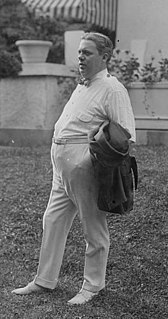
Henry Burr was a Canadian singer, radio performer and producer. He was born Harry Haley McClaskey and used Henry Burr as one of his many pseudonyms, in addition to Irving Gillette, Henry Gillette, Alfred Alexander, Robert Rice, Carl Ely, Harry Barr, Frank Knapp, Al King, and Shamus McClaskey. He produced more than 12,000 recordings, by his own estimate, and some of his most popular recordings included "Just a Baby's Prayer at Twilight", "Till We Meet Again" with Albert Campbell, "Beautiful Ohio", "I Wonder Who's Kissing Her Now" "When I Lost You" and "In The Shade Of The Old Apple Tree". A tenor, he performed as a soloist and in duets, trios and quartets.

"Joan of Arc " is a song by British band Orchestral Manoeuvres in the Dark (OMD) and was the third single released from their third studio album Architecture & Morality. The track has been described by OMD frontman Andy McCluskey as the group's "Mull of Kintyre".
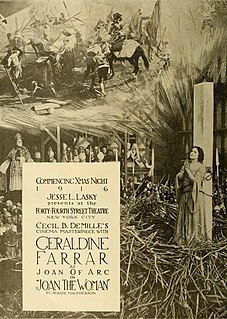
Joan the Woman is a 1916 American epic silent drama film directed by Cecil B. DeMille and starring Geraldine Farrar as Joan of Arc. The film premiered on Christmas Day in 1916. This was DeMille's first historical drama. The screenplay is based on Friedrich Schiller's 1801 play Die Jungfrau von Orelans. This film was considered to be the "first cinematic spectacle about Joan of Arc."

"When You and I Were Young, Maggie" is a folk song, popular song and standard written by George W. Johnson and James Austin Butterfield.

Joan of Arc is a 1922 cast of Paul Dubois's 1889 statue of Joan of Arc, located at Meridian Hill Park in Washington, D.C., United States of America. Joan of Arc was originally surveyed as part of the Smithsonian's Save Outdoor Sculpture! survey in 1994.
"Joan of Arc" is a song recorded by American singer and songwriter Madonna from her thirteenth studio album Rebel Heart (2015). It was written by Madonna, Toby Gad, Maureen McDonald and Larry Griffin Jr., with production being done by Madonna, Gad, AFSHeeN and Josh Cumbee. The song's demo was leaked onto the internet on December 17, 2014, with twelve other tracks from the album. Its final version was released on February 9, 2015 with two other tracks on the iTunes store. "Joan of Arc" is the eighth track on Rebel Heart and has similarity to the demo version, but with a lift in its tempo during the chorus. It is a guitar-led pop and electro-folk ballad, with drums and guitars being added as the song's instrumentation.

Hamilton: An American Musical is a sung-and-rapped-through musical by Lin-Manuel Miranda. It tells the story of American Founding Father Alexander Hamilton. Miranda said he was inspired to write the musical after reading the 2004 biography Alexander Hamilton by Ron Chernow. The show draws heavily from hip hop, as well as R&B, pop, soul, and traditional-style show tunes; and casts non-white actors as the Founding Fathers and other historical figures. Miranda described Hamilton as about "America then, as told by America now".

"Joan of Arc, They Are Calling You" is a 1917 song composed by Jack Wells, and with lyrics written by Al Bryan and Willie Weston. It appeared in the contemporary musical production, This Way Out.

Joan of Arc's Answer Song is a World War I song released in 1918. J.L. Lavoy is credited as the composer and lyricist. The song was published by J.L. Lavoy Music Publishers. It was written for both voice and piano. The lyrics are written in first person, and mentions the saint "Joan of Arc" once by name. The chorus addresses France specifically, and assures the country that America stands with them.

Joan of Arc, also known as Joan of Arc, Maiden of Orleans, is an outdoor copy of Emmanuel Frémiet's equestrian statue Jeanne d'Arc (1874), installed in Portland, Oregon's Laurelhurst neighborhood, in the United States. The bronze sculpture, which depicts Joan of Arc, was donated to the city by Henry Waldo Coe, who saw Frémiet's original statue in Paris. Portland's copy arrived from France in 1924 and was dedicated on Memorial Day in 1925 in honor of the Doughboys of World War I.
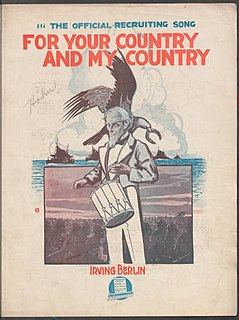
"For Your Country and My Country" is a World War I era song released in 1917. Lyrics and music were written by Irving Berlin. The song was published by Waterson, Berlin & Snyder, Co. of New York, New York. Artist Albert Wilfred Barbelle designed the sheet music cover. It features Uncle Sam playing a snare drum with an eagle on his shoulder. In the background are ships sailing, and below are troops marching. Above the title, it reads, "The Official Recruiting Song." The song was written for voice and piano, along with chords for guitar, ukulele, and banjo.

Jeannette: The Childhood of Joan of Arc is a 2017 French musical film directed by Bruno Dumont. It was screened in the Directors' Fortnight section at the 2017 Cannes Film Festival. It was followed two years later by the non-musical sequel Joan of Arc which premiered at the 2019 Cannes Film Festival, written and directed by Dumont and with Lise Leplat Prudhomme reprising her role. The script is an adaptation of the play "The Mystery of the Charity of Joan of Arc", written in 1910 by the Catholic author Charles Péguy.
Events from the year 1431 in France

















